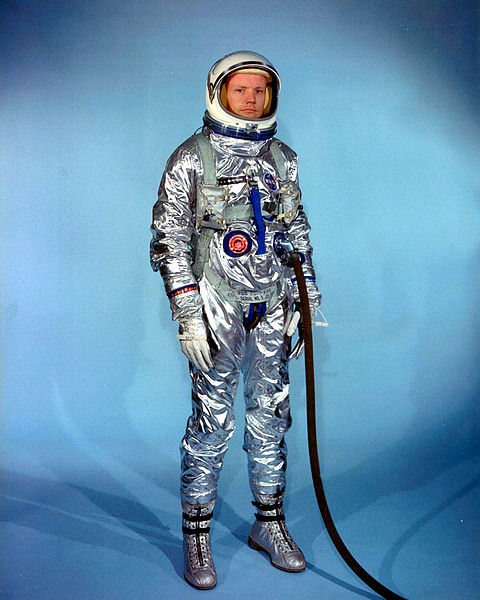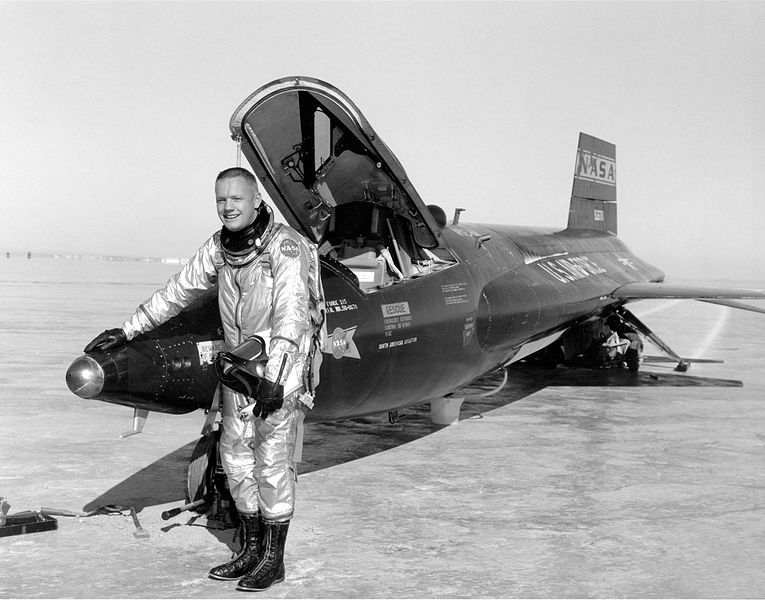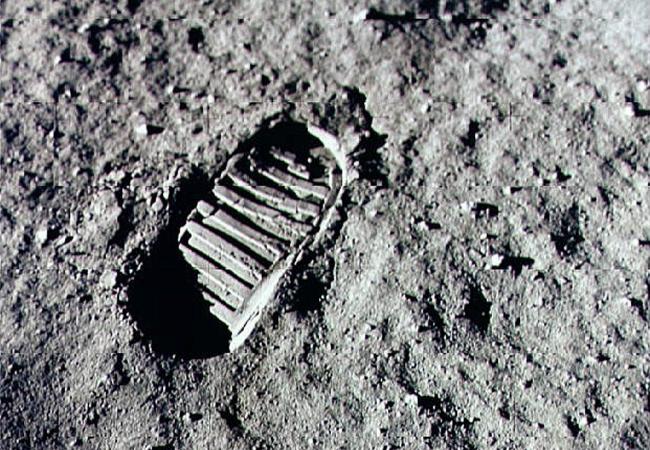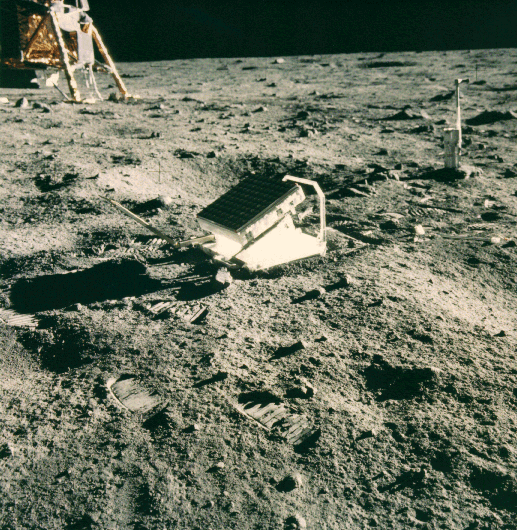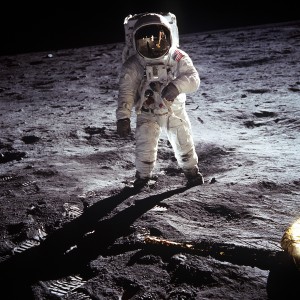I don’t think people should be exalted, any of us. No statues should be built. Even the best of us are disappointing–small and petty and vain and vengeful. We often take out our unhappiness on others. Even when being seemingly generous–celebrating our country, our community, our family, our friends–we’re often just celebrating ourselves. And we should never do that. We should remain humble.
Neil Armstrong was just flesh and bones like the rest of us. He had his bad days and his flaws. But it’s amazing that he displayed such humility while accomplishing so much and braving every challenge. Not everyone can afford to be so modest. Some people have so many strikes against them that they have to convince everyone else–even themselves–that they belong. But it’s great that the one of us who went the furthest, and got there first, stayed so down-to-earth. Neil Armstrong was above and beyond, and I’m not only talking about atmosphere and stratosphere.
From Oriana Fallaci’s 1966 book about the space program, If the Sun Dies:
“The third old man was thirty-four and looked like John Glenn’s young brother: the same freckles, the same fair coloring, the same ease; he had even been born in Ohio. Nevertheless certain things distinguished him from John Glenn–his lack of vivacity, his diplomacy and his shoulders that were extraordinarily rounded for such a strong physique. His mouth was ironical, but an irony full of caution. His voice was quiet, his movement economical. His name was Neil Armstrong and they picked him with the second group. The most interesting piece of information about him, for me, was that he didn’t have a service background. The only astronaut civilian I was to meet. And perhaps because of this he entered like someone visiting the dentist. And I felt indeed like a dentist, I was tempted to ask: Is it a molar that hurts or a canine? I would not have been at all surprised if he had answered: ‘No, Doctor, it’s an incisor.’ Sound track:
‘What a fine thing, Mr. Armstrong! You’re not from the service!’
‘I came from NASA, where I was an electronics engineer and a jet test pilot. It isn’t different. I mean, I’ve got as much discipline as the others and discipline is the main thing you need if you’re going into space. Besides, the reason they pick servicemen isn’t because they’re more suitable than civilians; they pick them because they’ve got them all neatly packaged and pre-selected so it’s easier to dig up the right man. You know everything about a serviceman, including how far you can trust him. But they knew everything about me too: I’ve been with NASA for several years.’
‘However, becoming an astronaut must give you great joy.’
‘I wouldn’t know. Let me think….”
‘Haven’t you thought about it before?’
‘To me it was simply being transferred from one office to another. I was in one office and then they moved me into this one. Well, yes, I suppose I was pleased. It’s always nice to gain in status. But I don’t have any personal ambition. My one ambition is to contribute to the success of this program. I’m no romantic.’
‘Do you mean that you don’t have a taste for adventure?’
‘For heaven’s sake, I loathe danger, especially if it’s useless; danger is the most irritating aspect of our job. How can a perfectly normal technological fact be turned into adventure? And why should steering a spacecraft be risking your life? It would be as illogical as risking your life when you use an electric mixer when making a milkshake. There should be nothing dangerous about making a milkshake and there should be nothing dangerous about steering a spacecraft. Once you’ve granted this concept, you can no longer think in terms of adventure, the urge of going up just for the sake of going up…’
I observed his mouth. Perhaps not the molar, not the canine, nor the incisor. It was probably the wisdom tooth.
‘Mr. Armstrong, I know somebody who would go up even if he knew he wouldn’t come back. Just for the urge to go up.’
‘Among us astronauts?’
‘Among you astronauts.’
‘I rule him out. If you knew him, he’d be a boy, not an adult.’
‘He’s an adult, Mr. Armstrong.’
‘But who?’
‘It doesn’t matter. Let’s talk about you. Leaving aside the milkshake, I suppose you’d be sorry not to go up?’
‘Yes, but I wouldn’t get sick about it. I don’t understand the ones who are so anxious to be the first. It’s all nonsense, kid stuff, just romanticism unworthy of our rational age. I rule out the possibility of agreeing to go up if I thought I might not come back, unless it were technically indispensable. I mean, testing a jet is dangerous but technically indispensable. Dying in space or on the Moon, is not technically indispensable and consequently if I had to choose between death while testing a jet and death on the Moon, I’d choose death while testing a jet. Wouldn’t you?’
No, it wasn’t the wisdom tooth that hurt. That one was healthy. It was something else, Father, a lack of pain, I would say, a good cry such as children have when they want the Moon, no matter if they have to die to get the Moon, that exquisite infancy which stays in us, as a gift, even when we are adults with all our teeth, our prudence.
‘No, confronted with such a dilemma, I’d unhesitatingly choose to die on the Moon: at least I’ll get a look at the Moon.’
‘Kid stuff. Nonsense. Die on the Moon! To get a look at the Moon! If it were a matter of staying there for a year or two…maybe…I don’t know. No, no, it would still be too high a price to pay because it’s senseless.’
‘Did you spend all your young years at NASA, Mr. Armstrong?’
‘I spent them traveling: Europe, Asia, South America. So I saw what there was to see, I understood what there was to understand, and here I am.’
‘Were you in the war, Mr. Armstrong?’
‘Sure, I was in Korea. Seventy-eight combat missions. I’d be lying if I said they’d done me any good.’
‘Do you have any children, Mr. Armstrong?’
‘Sure. One seven and one two. How could I not have children at my age?’
‘Ten minutes,’ said the Bureaucrat. ‘Hurry!’
He stood up. ‘I’d better say goodbye. I have to go in the centrifuge.’
‘I don’t envy you, Mr. Armstrong.’
‘Yes, it’s very disagreeable: perhaps the thing I hate most. But indispensable.’
‘Time’s up! Stop!’
‘Goodbye.’
‘Goodbye.'”

